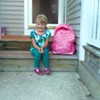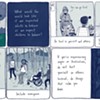Published August 27, 2019 at 10:00 a.m.
When my son was 5 years old, we were home together on a lovely summer Saturday. He wanted to stay inside, and threw a small tantrum when I told him he had to come out to work in the yard.
Earlier in the week, he and I had dug up some broken bricks from a short walkway in front of the house. This morning, I'd decided we would get dirt from the other side of the yard and fill in the holes. I told my son I needed his help. He questioned. I explained. He grumbled. But when I grabbed my shovel, he grabbed his.
I gave him a ride in the wheelbarrow across the yard, then we worked for an hour. We dug up dirt, hauled it, dumped it, and went back for more. We found jobs he was good at: tossing dirt with his shovel, picking out rocks, stomping on the dirt to flatten it. He was happy.
At some point he paused to tell me, in all earnestness, "Daddy, last night, when I was going to bed, I was thinking about what I wanted to do today."
"What were you thinking?" I asked.
He said, "I was thinking that this was exactly what I wanted to do today."
I was touched. And also skeptical. He couldn't have known what was in store that morning. But I know he believed what he was saying.
I think this is because our deeper needs trump our more superficial interests. My son's interest that morning was to chew watermelon-flavored gum and watch a kids' show on Netflix. His deeper, developmental and emotional needs were different. So different, in fact, that he reimagined his desires. He created a story of what he'd envisioned for himself so it corresponded to the work we were doing together.
This interaction reminds me of something I think about often in my work as a school principal — that our children, indeed all of us, have a deep need to be needed: to work alongside important people in our world and do work that needs doing in the places where we live.
Educators can — and should — orient curriculum in this direction: guiding students to recognize the work that needs doing, then helping them develop dexterity with the tools necessary for the tasks.
Some of what needs doing in Vermont is simply a deeper integration of school with the economic life of our towns, so that young people enter the local workforce and stay. One way that my school, Randolph Union High School, prioritizes this is through the work of our director of Career and Workforce Pathways, who develops classes that use local industry's factory and fieldwork sites as places for learning. This exposure helps students envision and chart meaningful school-to-college-to-career pathways.
Schools also need to engage students in addressing our world's pressing social and environmental concerns. The warming climate now disturbs our communities in ways both mundane and disastrous. Ticks bring debilitating illnesses north. Raging wildfires in Canada bring haze to Vermont skies. Soccer practices may be cancelled due to heat this fall. To say nothing of more grave disasters that may loom. We need our young people to confront this crisis.
We also need them to develop antidotes to the illness of white supremacy. The places where we live need young people to combat racist rhetoric and policies that divide our nation with often brutal violence.
Randolph Union's project-based learning courses are one way we engage students in addressing societal problems. In recent years, they have centered on topics from food systems to restorative justice. Students have produced documentary films, radio journalism and digital music. They have drafted legislation with state representatives, organized community events, published their work in print and on air, visited schools abroad, and organized student activists from across the state to combat racism in schools.
This fall, we're offering a project-based learning course called "Inequality and the Environment," grounded in the essential question, "How can we unite people of all class backgrounds to improve the health of our planet?" Students will tap into experts in climate change and income inequality to help shape their plans of action. I'm excited to follow their work.
I'm also looking forward to the work of our Racial Justice Alliance. Last year, this group worked to raise the Black Lives Matter flag and conducted community forums to ensure there was an understanding of why this gesture was needed. This year, one of their tasks will be to teach our community about the legacy of Emmett Till, the 14-year-old African American boy who was murdered in Mississippi after accusations that he whistled at a white woman. The first day of school, August 28, is the 64th anniversary of Till's brutal murder. We will not let it pass unnoticed.
I have been inspired by work in other schools as well. Matt Sheelan, a second grade teacher in California, engages his students in topics with personal and political dimensions, such as learning about skin color. As part of one project, his students described their own skin tones using descriptors including "peach caramel," "light tan," and "Russian coffee." They later learned about melanin and read a book on the science of skin color. Such lessons are courageously political because they destabilize the norm-defining power of whiteness and help students see that variation in skin color — not whiteness — is what's natural and normal. No one color can have claim to supremacy.
I've also been following — with 11,000 others on Twitter — the work of Illinois educator, Jess Lifshitz. Last spring, her fifth grade students read a biography of Martin Luther King Jr., then discussed what they learned or already knew about him. Terms included "black," "Civil Rights activist," "assassinated," "honor," "very respected," and "popular." The students then read several historical texts about King, and noted the new information they learned, including: "radical," "vilified by media," "63% of Americans had an unfavorable opinion," "poverty," and "targeted by FBI." Dr. King's story thus took on nuance. Lifshitz is helping her students become critical readers of history, able to challenge simplistic narratives with historical facts.
In a time of political polarization, it is no easy task to ground school curriculum in real-world challenges. But connecting children's learning with the deepest needs of the place where they live makes for the most engaging learning there is. Like working in the yard with my son, the work can feel both playful and strenuous. Childhood needs both. When children can name and see the work to be done, they will rise to the occasion with energy, curiosity and courage. They know that it is their present life and future that they're shaping.
This article was originally published in Seven Days' monthly parenting magazine, Kids VT.
Speaking of...
-

Summit Not Required: Reconsidering the Race to the Top
Aug 22, 2023 -

Use Your Words: A Mom and Early Childhood Educator Explains What She Learned About Managing Her Fear of the Climate Crisis
May 23, 2023 -

Rise and Shine? A Food Writer Navigates a Nauseous First Trimester
Feb 28, 2023 -

Use Your Words: To Cope With COVID-19, We Started a Business Together
May 17, 2022 -

Use Your Words: I Made a Kid. He's Pretty Cool, but 'Everything Hurts, and I'm Dying'
Feb 22, 2022 - More »
Comments
Comments are closed.
From 2014-2020, Seven Days allowed readers to comment on all stories posted on our website. While we've appreciated the suggestions and insights, right now Seven Days is prioritizing our core mission — producing high-quality, responsible local journalism — over moderating online debates between readers.
To criticize, correct or praise our reporting, please send us a letter to the editor or send us a tip. We’ll check it out and report the results.
Online comments may return when we have better tech tools for managing them. Thanks for reading.












































